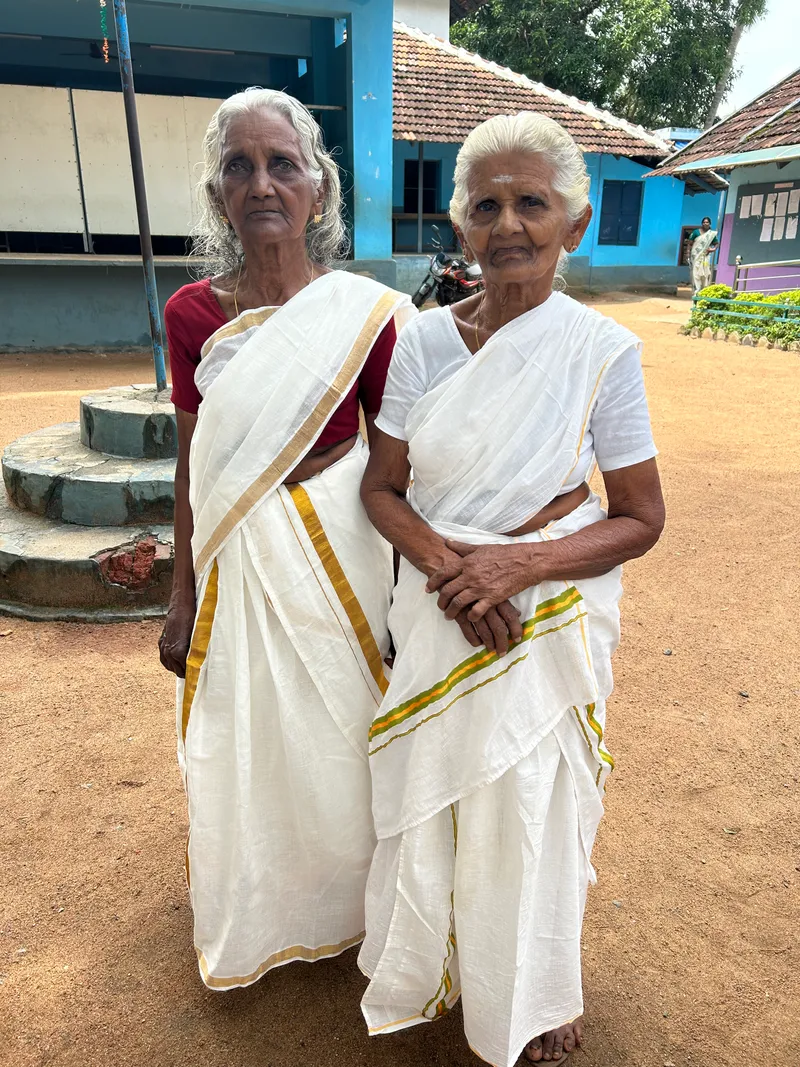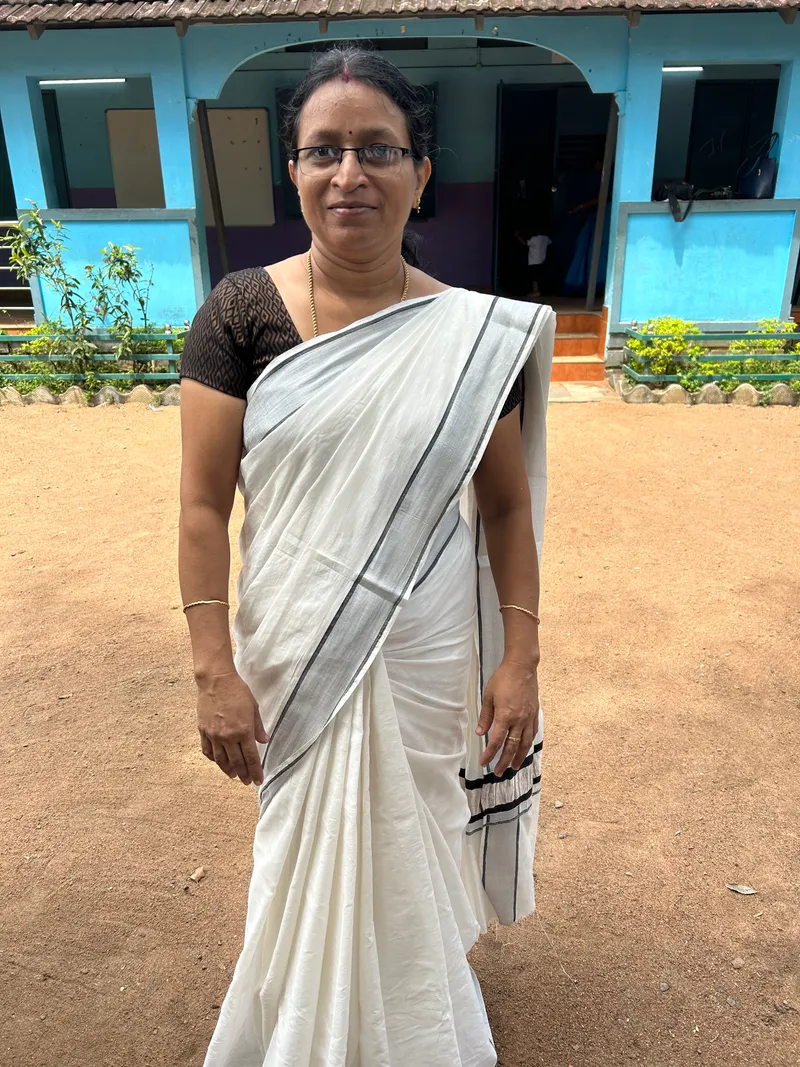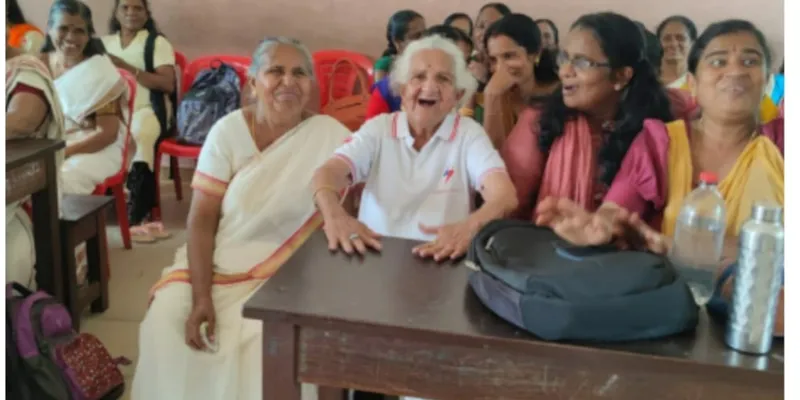How Kudumbashree’s back-to-school campaign is empowering lakhs of women in Kerala
The Kudumbashree Mission launched its two-month Thirike Schoolil (Back to School) campaign on October 1. It’s five-pronged module educates women on microfinance, goals of the organisation, social togetherness, digital literacy, and introduces them to new livelihood opportunities.
On October 1, the Kudumbashree Mission, one of the largest women’s self-help network groups in the country, launched an ambitious two-month campaign to send its 46 lakh members back to school.
As of November 6, the Thirike Schoolil (Back to School) programme has attracted over 20 lakh women to weekend classes conducted in 2,000 schools in all 14 districts of Kerala.
More than 50 lakh people, including 20,000 Area Development Societies, 1,070 Community Development Societies (CDSs), 15,000 resource persons, Kudumbashree Snehitha, members of various training groups, and state-district mission staff are part of this ambitious campaign.

Enthusiastic Ayalkootam members dress up to go back to school as part of Kudumbashree's Thirike Schoolil campaign.
I walk into the NUP School in Manappadam, Alathur Block, in Palakkad district a little after the bell has rung for the first period. I am invited to sit in a classroom and choose a corner where I am not the centre of attention. The focus here is on women–young and old–who are learning something new while fondly reminiscing about their days spent in school many decades ago.
The classroom is a sea of colour. Kudumbashree comprises of several Ayalkootams (Neighbourhood Groups) that sports its own uniforms–sarees of different colours–pinks, oranges, and greens—with the Kerala saree in off-white also making a striking difference.
The trainer, Sreeshma, is having an easy conversation with students. Around 50 enthusiastic “students” are listening to every word–as a projected screen flashes information in bullet points. In between, a child (whom a mother has brought to class) laughs loudly. There’s bonhomie, camaraderie and nostalgia all around.
There’s participation too. The women speak of the importance of local governance, smashing patriarchy, and becoming aspirational. There are stories of Ayalkootams stepping in to help people in distress–collecting money for a kidney transplant, rallying to help a neighbour who lost her husband, and more.
Sreeshma elaborates on the goals of the Kudumbashree mission and the importance of being financially and digitally literate, and the need for women to start their own businesses.
“What do you do with the jackfruit and mangoes that grow in your houses during the summer?” she asks. A woman stands up and replies, “I make jackfruit preserves, jams, mango pickles, and sell them.” There is applause all around.
In between, the class breaks into the Kudumbashree clap—a 1-2-1-2-3 rhythm that’s infectious.
These women, who are here from 9.30 am to 4.00 pm, are students for a day, but hope to take away learnings for a lifetime.
Changing lives

Women gather for the morning assembly at NUP School, Manappadam.
Nishad CC, State Program Coordinator, Kudumbashree Mission, outlines how the Thirike Schoolil programme can change the lives of its 46 lakh members.
“The Kudumbashree Mission completed 25 years in 2023. It was started as poverty alleviation and women empowerment programme in 1997. With this campaign, we decided that the best way to reorient women about the mission and its objectives was to get them together in a spirit of fun and togetherness. What better way than sending them back to school?”
With over three lakh Ayalkootams handling micro-finance activities running into crores in the state, Nishad says it was imperative to work around a concept that would educate and empower them.
“We conceptualised a five-topic module that includes educating women on financial planning and microfinance, the goals of the organisation and why it exists, social togetherness, introduce women to newer livelihood opportunities, and digital literacy,” he elaborates.
With over two lakh Ayalkootam WhatsApp groups, a concerted social media plan was put into action with messages, posters, and videos to attract women to the campaign.
A community effort

Never too old for school - Kanchana and Thankam
Local governance also plays an important part in ensuring the Kudumbashree campaign is a success.
Deepa, an accountant with the Puthucode Panchayat, says, “The women are very happy to come to school, wearing the uniforms of their Ayalkootam. There are 4,300 Ayalkootams in Puthocode panchayat itself, with women undertaking business activities in farming, catering, pickle-making, etc. They get a subsidy from the block units and avail of loans from Kudumbashree,” she says.
Haseena teacher, the President of the NUP School where the Thirike Schoolil classes are being held, is offering all support for the campaign.
“It’s wonderful to see many of our old students, now 50 or 60 years old, come back to school for this. Their enthusiasm is encouraging others to attend,” she says.
The day’s assembly has been shifted to a short break between classes. Women assemble on the ground, and led by the president and the office-bearers sing the Kudumbashree Mudra Geetham (anthem). There are claps all around.
“The feeling of nostalgia has been a critical element for the campaigns’ success. Women are coming to the classes together, and participating in discussions, sharing their lunches, while also speaking about their problems and difficulties, and ironing out their differences,” says Nishad.
Women of diverse talents

Pushpalatha who runs a fashion designing unit in Manappadam
In the three schools I visit in the Alathur block–NUP School in Manappadam, Gandhi Smaraka UP School in Anjumoorthy Mangalam, and the Sarvajana Higher Secondary School in Puthucode, the women attending the classes are from different backgrounds and have diverse talents.
Radha has been running the panchayat canteen for the past two-and-a-half years and is also a CDS member.
“I am learning a lot about organisational structure that I wasn’t aware of before. I hope that I can improve upon my business by learning new things here,” she says.
Pushpalatha who was a CDS chairperson for 15 years runs a fashion designing unit in Manapaddam.
“Before the pandemic, I ran a full-fledged unit by taking a building on rent. I taught fashion design to 100 girls. But after the losses incurred during the pandemic, I shifted it to a big room above my own house. Here, 10 girls help me out with sewing and design. I am also a designer and love teaching. Now, we have ventured into the online space and are taking local orders,” she says.
Divya has started a Haritha Karma Sena group of 22 members in her panchayat to collect non-biodegradable waste and send it for recycling. Shruthi runs a tuition centre for classes from second to 10th standard. All these women have taken advantage of Kudumbashree schemes to start or scale their businesses.
“Our biggest learning is being able to identify a large number of skilled and talented members. They can be the leaders to take the organisation forward,” Nishad says.
Age is just a number

110-year-old Rahel (centre). Photo courtesy: Kudumbashree
In Alappuzha district, 100-year-old Rahel is returning to childhood with the Thirike Schoolil programme. Forgetting the infirmities and pains of old age, she climbs the steps of the school with the help of others.
In the classroom, she’s a child again, curious and eager to assimilate all that’s happening–whether it’s the classes, the fun and games, or the banter.
In Manappadam, Kanchana (77) and Thangam (73) have accompanied their daughters to the classes.
“I have studied only up to the seventh standard. So, it feels very good to come back to school as students once again. Though I don’t have any business of my own, I am part of the Ayalkootam and am hoping to learn more about Kudumbashree and how I can change my life,” Kanchana says.
In Poyya Panchayat in Thrissur district, 84-year-old Ammini attended school for the first time in her life when she attended classes of Kudumbashree’s Thirike Schoolil campaign at the Poopathi Sarawathi Vidyalaya.
Despite her lack of formal education, Ammini says she understood what was being taught. She has been an agricultural labourer for many years.
Nishad says word-of-mouth publicity has played a huge part in the campaign’s success.
“For the first batch, we had to convince many members to attend. By the second session, word had spread, and women started coming in willingly. One should understand that they are attending classes on Sunday, a holiday for most women, which they would like to spend with their families,” he says.
About the criticism surrounding an incident where it was reported that women were threatened to attend the classes, otherwise their loans would not be passed, Nishad believes it’s politically motivated. He emphasises there is no place for politics in the Mission, and it’s completely secular in nature.
“Our biggest challenge, however, is to motivate more women to take up livelihood schemes and start their own businesses. Our aim is to make this an annual campaign and introduce new topics and subjects,” he says.
In the Gandhi Smarak School, the bell has rung for the lunch break at 1.15 pm. There are some young boys waiting outside the classes. They have brought lunch boxes from home for their mothers.
It’s a role reversal that’s heartening. But, for the 35 lakh women predicted to complete this programme on December 10, it will also be a new beginning--of new hopes and dreams of a better life.
Edited by Megha Reddy







